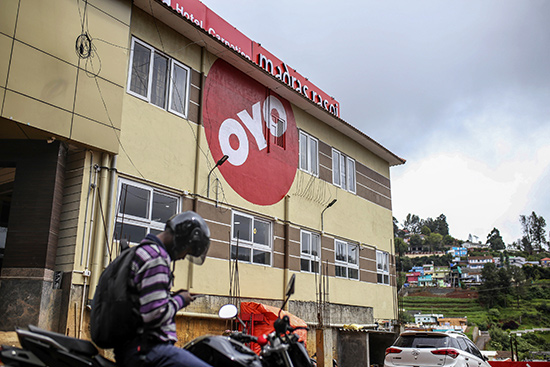Oyo是什么?软银最新投资的高增长高估值公司探秘

|
这家公司背后是软银支持,估值很高,增长率极高,可能颠覆整个行业,而且目前没有利润。 不,我们说的不是共享办公空间WeWork。来看看Oyo吧。总部位于印度的酒店初创公司主要翻新已有建筑并升级服务,实现统一标准,由此成为全球酒店业的领导者。根据公司发布的声明,上周刚宣布筹集15亿美元资本,在美国和英国等海外市场扩大投资,估值也翻了一番达到100亿美元。 创始人李泰熙(Ritesh Agarwal)将领衔该轮融资,投入7亿美元,软银和红杉印度等投资者将承担其余部分。据彭博社报道,李泰熙从瑞穗金融集团和野村控股获得了20亿美元贷款,部分将用于购买Oyo的新股。 李泰熙计划用剩下的贷款从Oyo现有投资者手中购买价值13亿美元的股票,以实现之前宣布的将公司持股增加到30%。他将使用名叫RA Hospitality Holdings的实体完成交易。 目前Oyo在80个国家有120万间客房,近几个月一直在积极推动印度境外的发展,上周的声明也与公司计划一致。今年6月,Oyo首席运营官阿比哈夫·辛哈对《财富》印度表示,希望“进入全球15-20个大国”。 今年5月,Oyo出资4.1亿美元收购了总部位于阿姆斯特丹的度假公寓租赁公司@Leasure;今年4月,Oyo吸引到爱彼迎投资,8月收购了拉斯维加斯的Hooters 赌场酒店。投资者对各项收购兴奋不已,认为未来Oyo确实能主导酒店行业。 “Oyo有两大核心能力:一是有效地改造现有的酒店,二是技术支持的物业管理,为将来有一天公司成为全世界最大的连锁酒店奠定了基础。”红杉印度顾问兼董事总经理莫伊特·巴哈特那迦告诉《财富》印度。 前所未有的高增长也引发不少担忧,有人担心公司扩张速度过快,可能无法持续提供“高品质的入住体验”。李泰熙接受《财富》印度采访时表示,公司在建筑方面已经实现逐年盈利,此前的7月他拒绝就盈利时间对《华尔街日报》发表评论。 融资方面,李泰熙则是真正的行动派。凯斯西储大学研究独角兽公司的助理教授阿纳特·阿隆-贝克表示,虽然创始人亲自主导一轮融资并不常见,但对投资人来说似乎是个令人鼓舞的迹象。 “他没有既不掏钱还拼命揽权,自己也投入其中。”阿隆-贝克说。“他在告诉投资人,‘看,我自己也能找来钱。我去贷款,真正下了本钱。我在拿自己的资本冒险。’” 不过,也有人质疑李泰熙并未让机构投资者牵头本轮交易,会不会是危险信号。投资平台Republic的首席执行官肯·阮说,如果找家知名公司牵头,相当于其他投资者也都投下信任票。 “最好的办法是找外部机构。”阮说。 阮表示,李泰熙的做法也没错,但一个25岁的人拼尽全力争取贷款还是相当特殊的情况。阮认为,现在机构投资者应该对Oyo“稍微谨慎一点”。 Crunchbase的数据显示,成立于2013年的Oyo前几轮融资中融到了17亿美元,最近的融资消息发布之前其估值为50亿美元。阿隆-贝克说,随着李泰熙不断吸引软银等知名投资方,Oyo的估值将继续推高。 “如果真是独角兽,就不需要通过公开市场赚钱。”阿隆-贝克说。“只要加入独角兽俱乐部,就有大批投资者。”获得软银的认可实现该目标的第一步,因为软银能够为初创企业显著“提升可信度”,L.A. Tech House的加布·乌利布说。 对软银来说,通过该笔投资可进一步深入印度市场,此前软银已经在印度投资了最具价值的初创公司Paytm,是估值约150亿美元的数字支付公司。 与此同时,因最近Uber和WeWork等投资业绩不佳,软银的首席执行官孙正义“尴尬又着急”。 但乌利布认为,印度的几笔投资并不能证明软银发掘价值的能力。他认为业绩不佳主要怪初创企业本身。“基金的任务是识别并确定创新技术,一直都是这么做的。”乌利布说。“基金是科技行业孵化器,而不是金融咨询集团。因此,我认为,企业IPO失误就认为软银能力欠缺并不公平。” 也许确实如此,但软银肯定希望这次押注高增长、高估值的公司结果能比WeWork好。(财富中文网) 译者:冯丰 审校:夏林 |
This Softbank-backed company has a wild valuation. Sky-high growth. Potential to disrupt an entire industry. And no profits in sight. No, we're not talking about WeWork. Meet Oyo. The hotel startup—based in India—renovates existing buildings and upgrades services to meet a set of uniform standards that has made it a global leader in the hospitality market. And it doubled its valuation to $10 billion after the company announced last week it is raising $1.5 billion in capital to expand its presence in foreign markets, including the U.S. and the U.K, according to a company statement. Founder Ritesh Agarwal will lead the round financing, putting up $700 million, while other investors such as SoftBank and Sequoia India will pick up the rest of the tab. Agarwal secured loans worth $2 million from Mizuho Financial Group and Nomura Holdings, which he will use in part to purchase new shares of Oyo, according to Bloomberg. Agarwal plans to use the rest of the loans to buy $1.3 billion worth of shares from Oyo’s existing investors as part of his previously announced plan to increase his stake in the company to 30%. He will use an entity called RA Hospitality Holdings to complete the transactions. Oyo, which operates 1.2 million rooms in 80 countries, has been aggressive in its push to grow outside of India’s borders in recent months, and last week's announcement falls in line with the company’s plan. Abhihav Sinha, chief operating officer for Oyo, told Fortune India in June the company wanted to “be in 15-20 large countries across the globe.” The company purchased Amsterdam-based @Leasure, a vacation rental company, for $410 million in May while in the U.S., Oyo drew in Airbnb as an investor in April and also purchased the Hooters Casino Hotel in Las Vegas in August. The acquisitions excite investors who see Oyo dominating the hotel industry in the future. “Oyo’s two capabilities—efficient transformation of existing hotels and tech-enabled property management—provide the foundation for the company to become the largest hotel chain in the world someday,” Mohit Bhatnagar, managing director, Sequoia Capital India Advisors, told Fortune India. But this unprecedented growth comes with some concern the company won’t be able to deliver a “high-quality living experience consistently” given the pace of expansion. Agarwal said in the interview with Fortune India that company has been profitable on a year-over-year basis at the building level after previously refusing to comment on when the company would be profitable to The Wall Street Journal in July. Agarwal is putting his money where his mouth is though. While unusual for a founder to lead a financing round, the move seems to be an encouraging sign for investors, said Anat Alon-Beck, an assistant professor who studies unicorn companies at Case Western Reserve University. “He’s not just maintaining control without putting money in—he’s also playing the game,” Alon-Beck said. “He’s showing investors, ‘Look, I can bring in money, too, from my own pocket. I took out loans. I have skin in the game. I’m risking my own capital.’” Others, however, question whether it's a red flag that Agarwal did not secure an institutional investor to head the round. Getting a well-known firm to be the lead equates to a vote of confidence for other investors, said Ken Ngyuen, CEO of Republic, an investment platform. “The optimal approach would be to get an external institution,” Nguyen said. While Nguyen said there’s nothing wrong with what Agarwal is doing, it’s a rather unique scenario for an individual to secure a loan of the size the 25-year-old was able to get. Nguyen thinks institutional investors are a “little more cautious” with Oyo now. The company, which was founded in 2013, had raised $1.7 billion in previous rounds of funding and was valued at $5 billion before the recent funding news, according to Crunchbase. Agarwal keeps attracting high-profile investors like SoftBank, which will keep driving Oyo’s valuation higher, Alon-Beck said. “You don’t need public markets for money if you’re a unicorn,” Alon-Beck said. “Once you’ve joined the unicorn club, you’re going to get plenty of investors.” Earning SoftBank’s seal of approval has been one of the first steps in reaching that goal because the investment fund brings “incredible validity to startups,” said Gabe Uribe of L.A. Tech House. For SoftBank, it furthers the company's move into India, where it has also invested in the country’s most-valuable startup Paytm, a digital payment firm that is valued around $15 billion. That comes as other investments such as Uber and WeWork have left CEO Masayoshi Son "embarrassed and impatient" because of his recent track record. But Uribe does not see these investments as indicative of SoftBank’s ability to spot value. He puts the failing performances on the startups themselves. “The fund's job is to recognize and identify innovative technologies, which it has and continues to do,” Uribe said. “The fund is a tech incubator, not a financial advisory group. So I don’t think it's fair to see mishandled IPOs as a reflection of Softbank." That may be, but certainly SoftBank is hoping that this high growth, high valuation bet turns out better than WeWork. |













